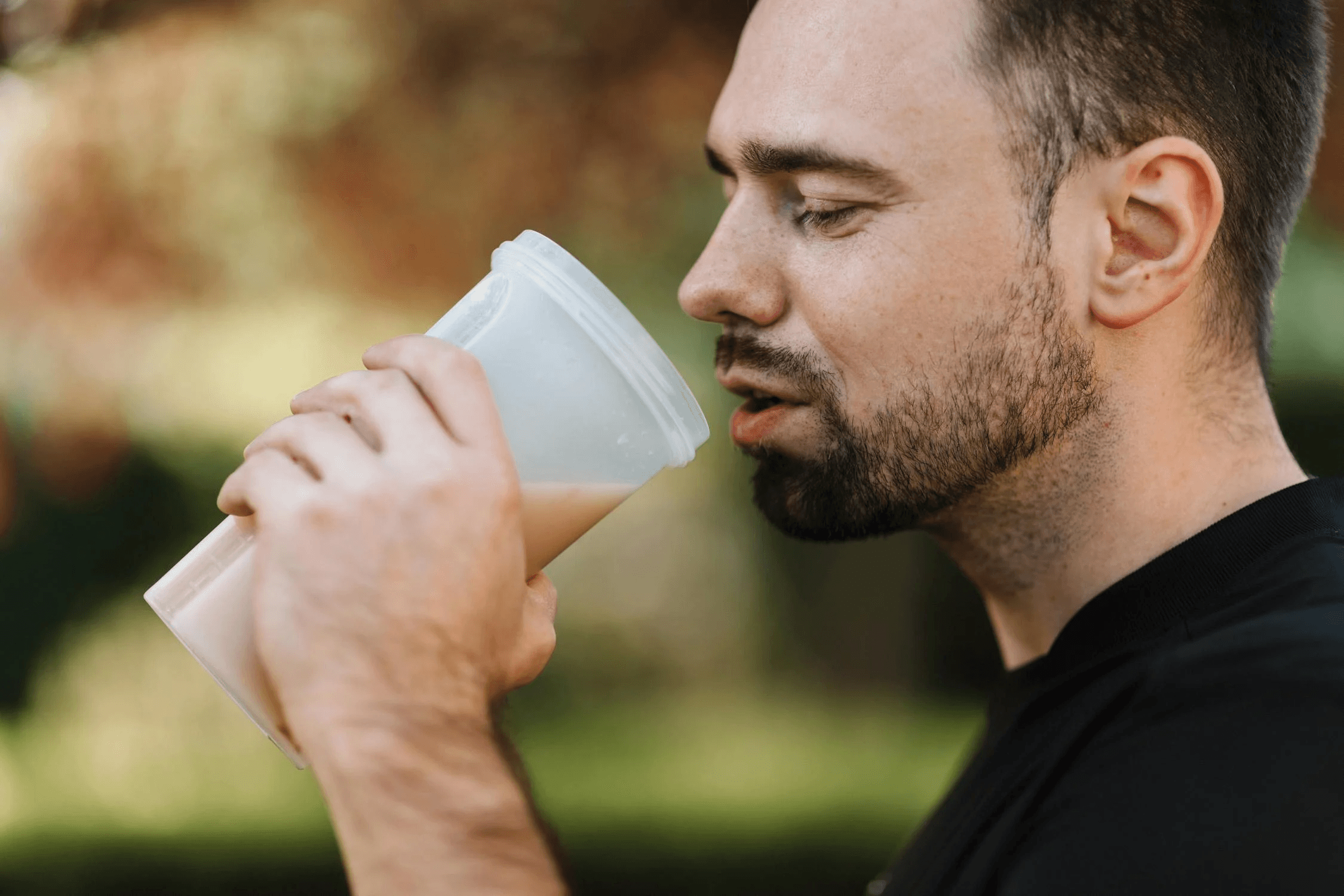We know protein is an essential nutrient for health, but how much protein should we eat each day?
After water, there are more proteins in the body than any other compound. Protein is one of the three macronutrients: protein, carbohydrates, and fats, and adequate intake is vital for good health. It's needed for a broad range of bodily functions, including enzyme production, bone health, and tissue growth and repair.
Read this article for more information about the benefits of protein.
There's no magic number for protein intake - the optimum amount for each individual depends on a variety of factors, including age, gender, weight, exercise regime, and health goals. In this article, we'll look at exactly what protein is and learn about its many functions within the body. We'll also look at how protein requirements vary throughout our lives, and the many different factors which affect our protein needs.
Read on to learn more about protein and how to determine the best intake for your needs.
Why is a recommended protein intake important?
Proteins are made up of organic compounds called amino acids. Your body needs around 20 amino acids to do all of its daily protein business, and it can make some of these itself. However, there are nine essential amino acids which the body cannot make, so they must be obtained from your diet each day. These are:
- Histidine
- Methionine
- Phenylalanine
- Isoleucine
- Leucine
- Lysine
- Tryptophan
- Threonine
- Valine
Some protein foods contain all of these nine amino acids, but some plant-based protein foods only contain a few, so it's important to combine a wide variety of different protein sources each day if you're vegan or vegetarian. Eating an adequate amount of protein from a range of sources ensures that your body is getting all the nutrients it needs to operate at the optimum level.

Recommended protein intake for adults
The daily reference nutrient intake (RNI) for adults is around 0.6-0.8g of protein per kg of body weight each day(1), but this is just the bare minimum we need to keep our bodies functioning. Optimum protein intake can vary dramatically from person to person, depending on their age, lifestyle, gender, weight and fitness level. The protein requirements for the 'average' adult are currently 0.8g of protein per kg of body weight. However, we've learned that there are many factors which can affect our protein needs and our protein intake:
Protein for athletes and fitness fanatics
If you're an athlete, fitness fanatic, or even just take regular exercise, you'll probably be aware that this will increase your protein needs. You'll need more protein to support new muscle development, especially if you're strength training, and for muscle repair and recovery following exercise. Depending on the amount of regular exercise you do, you should be consuming between 1.2 - 2g of protein per kg of body weight(2), though some elite athletes may need up to 3g per kg. (2,3,4) Speak to your health professional for personalised recommendations.
Protein for pregnancy
Should pregnant women be eating for two (or more!)? Whilst women don't need to double their food intake during pregnancy, their nutrient requirements do indeed increase in the final two trimesters. The actual amount will still vary according to weight and activity level but an average pregnant woman should aim to eat around 1.1g per kg of protein daily and ensure an intake of at least 60g of protein per day. (5,6)

Protein intake on restricted or exclusion diets
Our diet is a very important part of our life. With our individual likes, dislikes, food allergies/intolerances, medical conditions, weight and fitness goals, and moral considerations, it can be a highly personal, and often highly emotive, subject for us. It's particularly important to monitor protein intake when eating a restricted diet:
- Weight loss:
If we want to restrict our food intake to lose weight, it's important to remember that diets are not just all about eating a certain number of calories. Your daily calories must still provide you with the nutrients you need and it's recommended that around 35% of your daily calorie intake should come from protein, though again, optimum intake will depend on your activity level and individual requirements.
For tips on making every calorie count, read our article on 28 Quick Ways to Cut Calories. There can be benefits to eating higher levels of protein when on a weight management diet, as protein can help to aid weight loss by balancing blood sugar, reducing cravings for sugary foods, and helping you to feel fuller for longer. (7) Read our in-depth article for more detailed information about the relationship between protein and weight loss.
Whatever we do or don't, can or can't eat, if we restrict or exclude any major food groups, then it's important to ensure that the restricted foods are replaced with other foods that offer the same nutritional value. The good news is that there are a multitude of protein sources to choose from, so you should always be able to meet your protein needs. If you're on any sort of restricted diet and are unsure how to meet your nutrient requirements, then consult a nutrition professional, or subscribe to a healthy meal prep service so know your meals are balanced and your protein needs are covered.
Protein requirements by age
Our protein needs don't stay the same throughout our lives - age is also a factor in determining our daily protein requirements. Let's take a look at some examples to see how our individual protein needs might change throughout our lives, from birth to old age.
Recommended protein intake for infants and children
As protein is needed for growth, children's protein needs must be met, but the amount they need to function is still relatively small compared to adults. Though teenagers and adults require more grams of protein each day, comparatively speaking children require more protein per kg of body weight: children aged 4-13 years require 0.95g per kg whereas teenagers and adults 14-18 years and beyond require around 0.8g per kg. These figures are based on requirements for both growth and maintenance, but not physical activity.
This works out as these average intakes for children(1):
0-12mths - 12.5-13g
1-3 years - 13-15g
4-6 years - 15-20g
7-10 years - 20g
11-14 years - 20-30g

However, more recent studies (9) suggest that these recommendations are too low and that the RNI should be closer to 1.5g per day for children aged 6-10 years old. These figures also don't take into account a child's activity level. Physical exercise increases the need for protein to replace amino acids and to develop and maintain muscle mass, and many parents of very active children want to know if they can give their children protein powders. Medical professionals tend to advise against this, as whilst child athletes may have a slightly increased need for protein, too much protein is equally not advisable for children. Overall, it's important to ensure children are meeting their minimum protein requirements, but if your child is very active or you think they're not developing as they should, speak to a doctor or health professional for more personalised advice before significantly increasing their daily protein intake.
Recommended protein intake for teenagers
The teenage years are a challenging time for kids, both physically and mentally. Protein requirements peak at around 0.8g per kg of body weight, remaining largely the same throughout adulthood. Protein needs also start to vary more according to gender during adolescence.
Average daily RNIs for 15-18-year-olds are 42.1g for males and 41.2g for females. (1).
This can be a time of extreme variations in physical activity and lifestyle. Typically, teenagers have a low level of physical activity(10) but it's also a time when many teenagers might start to take fitness, sports and games more seriously. They're also likely to experiment with different lifestyle choices like extreme dieting or vegan/vegetarian diets. This is where, without proper care, teenagers may start to fall short of their optimum protein intake.
It's also a very stressful time of life, with hormonal changes, dating, and exam pressures, and these stressors can also affect protein requirements. For more about the connection between protein and mental health, read our article Can protein help support mental health?

Protein for older people
Our activity levels often reduce as we get older, so you might think that older people need to eat less protein; however, the reverse is true. Research (11,12) suggests that our protein needs increase as we age because protein turnover declines from 30% in normal adulthood to 20% by age 70, and that older people should be eating around 1.2g per kg of body weight daily, and at least 20g of protein at each meal. There are concerns that many older adults are not eating enough protein, as lack of exercise, dental issues, and medical conditions may affect appetite and eating patterns.
Low physical activity levels also lead to muscle loss, known as sarcopenia, in older adults. Low protein intake will exacerbate this, which can also affect skin health, immune function, wound healing and recovery from illness or injury. It is possible to rebuild muscle mass even after age 70, with regular exercise and adequate nutrition. However, it can be difficult for older people to shop for and prepare nutritious meals which contain enough protein for their needs, so it can be helpful for them to subscribe to a healthy, balanced meal prep service
How much protein can your body absorb in a day?
For years, it was believed that the body could only use around 20-25g of protein per meal for muscle growth. However, recent research (13) suggests the body can process and utilise larger amounts of protein over an extended period. Rather than excess protein being wasted, it appears that higher intakes continue to support muscle repair and growth, just at a slower rate as larger quantities take longer to digest. This suggests that the idea of sticking to a strict upper limit per meal is unnecessary. It's therefore more important to focus on reaching your daily protein targets than on consuming a specific amount of protein at any given meal. The Recommended Daily Allowance (RDA) for protein is 0.8g per kilogram of body weight, which equates to roughly 56g for men and 46g for women. However, for active individuals, protein needs are higher, typically 1.2-2.2g per kilogram.
However, getting all your daily protein in one meal isn't ideal, and ensuring that you do eat at least 20g of protein at each meal will help you reach your daily protein goals more easily. Spreading intake across the day also optimises muscle repair and growth by providing a steady supply of amino acids. While your body can absorb and process large amounts of protein daily, not all of it is used for muscle. After a certain point, excess protein is converted into energy or stored as fat if not needed for repair or other functions.

What can impact how much protein your body absorbs?
While the body can digest and absorb almost all the protein eaten, there are various factors which may affect how much is used for muscle growth such as age, sex, and activity level. For example,
- Type of protein - Some proteins are digested more quickly than others. For example, both whey and casein proteins are derived from dairy, but whey is fast-digesting and is therefore ideal to have in a post-workout protein shake, while casein digests slowly, so it can be great to take in a shake before bed or as a snack to fill you up. Some vegetarian sources of protein don't contain all essential amino acids, so you should make sure to combine them to get a full amino acid profile. Read more about getting enough protein as a vegetarian on our blog.
- Gut health - conditions like IBS can affect digestion and reduce absorption.
- Age - older adults may not utilise protein efficiently, so they may need more protein per meal to achieve the same muscle-building effect as younger individuals.
- Exercise - your body needs protein to repair and build muscle, so regular exercise will affect how much protein you absorb. Read our blog about how much protein you need to build muscle.

How much protein can your body absorb after a workout?
After exercise, your muscles are primed to absorb and use protein for repair and growth.
Whilst it's good to consume carbohydrates and protein post-workout to replenish glycogen stores and aid muscle recovery, it's the total daily intake which is more important. If you're meeting your overall protein needs, the precise timing becomes less critical. Research (14,15) suggests consuming 20-40g of protein every three to four hours throughout the day maximises muscle recovery; however, some athletes find that post-workout protein helps them recover faster, especially if using fast-digesting proteins like whey.
Find out more about this topic on the blog: Should you have protein before or after a workout?
Summary:
Hopefully, this article has helped you to understand more about your protein needs and how these might vary. To sum up:
- Your body needs 9 essential amino acids from your diet each day
- Adults need around 0.6-0.8g of protein per kg of body weight daily, but your optimum individual protein requirements will vary depending on your age, weight and lifestyle.
- Pregnant women and older adults have an increased need for protein.
- If you're on any form of restricted diet, then make sure you are replacing these foods with other types of protein.
This is an article in the Prep Kitchen Protein Series. For some of the other articles in the series, check out the list below:
Can protein help support mental health?
How much protein should you eat to build muscle?
You may also like to take a look at these other related articles on our website:
Benefits of fibre in your diet
Are you eating too much sugar?
References:
- Protein - British Nutrition Foundation. Available at: https://www.nutrition.org.uk/healthy-sustainable-d... (Accessed: 17 November 2023).
- Williamson E, Fung HJW, Adams C, West DWD, Moore DR. (2023) Protein Requirements Are Increased in Endurance-Trained Athletes but Similar between Females and Males during Postexercise Recovery. Med Sci Sports Exerc. ;55(10):1866-1875. doi: 10.1249/MSS.0000000000003219. Epub 2023 May 19. PMID: 37710376.
- Thomas et al Nutrition and athletic performance. Medicine & Science in Sports & Exercise. 2016;48(3):543-568. doi:10.1249/MSS.0000000000000852
- Jager R, Kerksick CM, Campbell BI, et al. International society of sports nutrition position stand: protein and exercise. J Int Soc Sports Nutr. 2017;14:20. doi:10.1186/s12970-017-0177-8
- Institute of Medicine . Dietary Reference Intakes for Energy, Carbohydrates, Fiber, Fat, Fatty Acids, Cholesterol, Protein and Amino Acids. National Academy Press; Washington, DC, USA: 2005.
- Murphy MM, Higgins KA, Bi X, Barraj LM. Adequacy and Sources of Protein Intake among Pregnant Women in the United States, NHANES 2003-2012. Nutrients. 2021 Feb 28;13(3):795. doi: 10.3390/nu13030795. PMID: 33670970; PMCID: PMC7997328.
- Leidy HJ, Tang M, Armstrong CL, Martin CB, Campbell WW. The effects of consuming frequent, higher protein meals on appetite and satiety during weight loss in overweight/obese men. Obesity (Silver Spring). 2011 Apr;19(4):818-24. doi: 10.1038/oby.2010.203. Epub 2010 Sep 16. PMID: 20847729; PMCID: PMC4564867.
- Lonnie M, Hooker E, Brunstrom JM, Corfe BM, Green MA, Watson AW, Williams EA, Stevenson EJ, Penson S, Johnstone AM. Protein for Life: Review of Optimal Protein Intake, Sustainable Dietary Sources and the Effect on Appetite in Ageing Adults. Nutrients. 2018 Mar 16;10(3):360. doi: 10.3390/nu10030360. PMID: 29547523; PMCID: PMC5872778.
- Hudson JL, Baum JI, Diaz EC, Borsheim E. Dietary Protein Requirements in Children: Methods for Consideration. Nutrients. 2021 May 5;13(5):1554. doi: 10.3390/nu13051554. PMID: 34063030; PMCID: PMC8147948.
- van Sluijs EMF, Ekelund U, Crochemore-Silva I, Guthold R, Ha A, Lubans D, Oyeyemi AL, Ding D, Katzmarzyk PT. Physical activity behaviours in adolescence: current evidence and opportunities for intervention. Lancet. 2021 Jul 31;398(10298):429-442. doi: 10.1016/S0140-6736(21)01259-9. Epub 2021 Jul 21. PMID: 34302767; PMCID: PMC7612669.
- Morris, S.; Cater, J.D.; Green, M.A.; Johnstone, A.M.; Brunstrom, J.M.; Stevenson, E.J.; Williams, E.A.; Corfe, B.M. Inadequacy of Protein Intake in Older UK Adults. Geriatrics 2020, 5, 6. https://doi.org/10.3390/geriatrics5010006
- Chernoff R. Protein and older adults. J Am Coll Nutr. 2004 Dec;23(6 Suppl):627S-630S. doi: 10.1080/07315724.2004.10719434. PMID: 15640517.
- Trommelen, J., Van Lieshout, G. A., Nyakayiru, J., Holwerda, A. M., Smeets, J. S., Hendriks, F. K., Van Kranenburg, J. M., Zorenc, A. H., Senden, J. M., Goessens, J. P., Gijsen, A. P., & Van Loon, L. J. (2023). The anabolic response to protein ingestion during recovery from exercise has no upper limit in magnitude and duration in vivo in humans. Cell Reports Medicine, 4(12), 101324. https://doi.org/10.1016/j.xcrm.2023.101324
- Kerksick, C. M., Arent, S., Schoenfeld, B. J., Stout, J. R., Campbell, B., Wilborn, C. D., … Antonio, J. (2017). International society of sports nutrition position stand: nutrient timing. Journal of the International Society of Sports Nutrition, 14(1). https://doi.org/10.1186/s12970-017-0189-4
- Schoenfeld, B.J., Aragon, A.A. How much protein can the body use in a single meal for muscle-building? Implications for daily protein distribution. J Int Soc Sports Nutr 15, 10 (2018). https://doi.org/10.1186/s12970-018-0215-1




